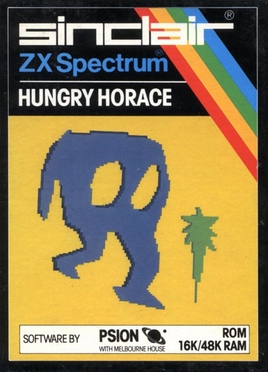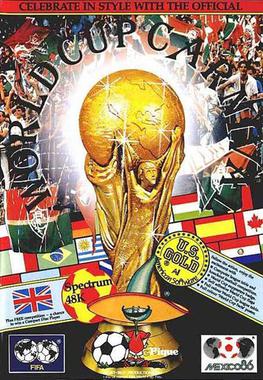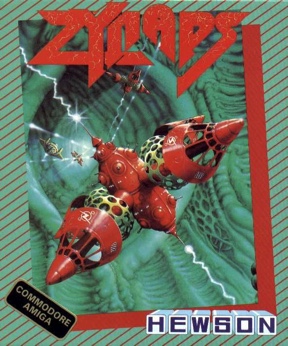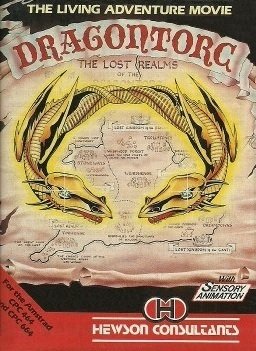
The Quill is a program to write home computer adventure games. Written by Graeme Yeandle, it was published on the ZX Spectrum by Gilsoft in December 1983. Although available to the general public, it was used by several games companies to create best-selling titles; over 450 commercially published titles for the ZX Spectrum were written using The Quill.

Jetpac is a shooter video game developed and published by Ultimate Play the Game and released for the ZX Spectrum and VIC-20 in 1983 and the BBC Micro in 1984. It is the first game to be released by Ultimate Play the Game, the company which later became Rare. The game follows Jetman as he must rebuild his rocket in order to explore different planets, while simultaneously defending against hostile aliens. It was written by Ultimate co-founder Chris Stamper with graphics designed by his brother, Tim Stamper. Reviewers praised Jetpac's presentation and gameplay, and it won "Game of the Year" at the Golden Joystick Awards in 1983.

Game Over is an action video game developed by Dinamic Software and published by Imagine Software in 1987. It was released for the Amstrad CPC, Commodore 64, MSX, Thomson TO7, and ZX Spectrum. The game includes some adventure game elements. A prompted unrated sequel, Game Over II, was released in 1987.

The Lords of Midnight is an epic fantasy video game combining aspects of wargames and graphic adventures, written by Mike Singleton and originally released in 1984 for the ZX Spectrum. Very well received from the beginning, it was soon converted for the Amstrad CPC and Commodore 64. The game featured an innovative 3-D effect that Singleton called landscaping, which served to bring the player into the game much more than usual. The Lords of Midnight is often named with Elite as among the top role-playing games of the 1980s. The player must destroy Doomdark, the evil Witchking who has locked the Land of Midnight in perpetual winter. There are multiple ways in which this can be achieved. It was followed by Doomdark's Revenge also in 1984, and Lords of Midnight: The Citadel in 1995.

Hungry Horace is a video game developed by Psion Software Ltd. and published by Sinclair Research in 1982 for Commodore 64, Dragon 32/64, Timex Sinclair 2068, ZX Spectrum, and later for Microsoft Windows and Android. It is the first game in the Horace series. The gameplay is noted to be very similar to Pac-Man, involving the collection of food pellets in a maze while avoiding enemies. Despite this, critical reception of the game was generally positive upon release.

Artic Computing was a software development company based in Brandesburton, England from 1980 to 1986. The company's first games were for the Sinclair ZX81 home computer, but they expanded and were also responsible for various ZX Spectrum, Commodore 64, BBC Micro, Acorn Electron and Amstrad CPC computer games. The company was set up by Richard Turner and Chris Thornton. Charles Cecil, who later founded Revolution Software, joined the company shortly after it was founded, writing Adventures B through D. Developer Jon Ritman produced a number of ZX81 and Spectrum games for Artic before moving to Ocean Software.

Knight Tyme is a computer game released for the ZX Spectrum, Amstrad CPC, Commodore 64 and MSX compatibles in 1986. It was published by Mastertronic as part of their Mastertronic Added Dimension label. Two versions of the ZX Spectrum release were published: a full version for the 128K Spectrum and a cut-down version for the 48K Spectrum that removed the music, some graphics and some locations.

Dan Dare: Pilot of the Future is a 1986 video game by Virgin Games for the ZX Spectrum, Amstrad CPC and Commodore 64 home computer systems. It is based on the classic British comic strip Dan Dare. The Commodore 64 version was considerably different in gameplay to the ZX Spectrum and Amstrad CPC versions.

Countdown to Doom is a text adventure game written by Peter Killworth for the BBC Micro and published by Acornsoft in 1982. It is set on the planet Doomawangara, which is coyly shortened to "Doom". An Acorn Electron version was released in 1984 but only as a ROM cartridge for the Plus 1 expansion. This was the only game released exclusively as a ROM cart for the Electron. There are two sequels, both published by Topologika: Return to Doom and Last Days of Doom.

Match Day is a football computer game, published by Ocean Software in 1984 for the ZX Spectrum. It is the first game in the Match Day series, and was the creation of programmer Jon Ritman and Chris Clarke. Versions were later released for the Amstrad CPC and PCW, BBC Micro, Commodore 64 and MSX systems.

World Cup Carnival is a 1986 sports video game developed by Artic Computing and published by U.S. Gold for the Amstrad CPC, Commodore 64 and ZX Spectrum; it is the first licensed World Cup video game and is based on the 1986 FIFA World Cup in Mexico. Initially meant as an entirely different game, development problems made U.S. Gold decide to recycle Artic Computing's 1984 title World Cup Football, with the added FIFA license and extras included in the box.
Quicksilva was a British games software publisher active during the early 1980s.
Crystal Computing, later renamed Design Design, was a British video game developer founded in 1982 by Chris Clarke and Ian Stamp while students at the University of Manchester. Graham Stafford, Neil Mottershead, Simon Brattel and Martin Horsley, joined the company as it expanded. The company's first software release was a compilation of games for the Sinclair ZX81, though it was with the ZX Spectrum that Crystal found its greatest success. A deal with the machine's manufacturer Sinclair to distribute Crystal's Zeus Assembler gave the company sufficient funds for a major marketing campaign for their next product, Halls of the Things, an arcade adventure game that became their most successful title.

Zynaps is a side-scrolling shoot 'em up video game published by Hewson Consultants for the ZX Spectrum, Amstrad CPC and Commodore 64 in 1987 and for the Atari ST in 1988 and the Amiga.
Thorn EMI Computer Software was a British video games software house set up in the early 1980s as part of the now-defunct British conglomerate Thorn EMI. They released a number of games in the early 1980s, initially for the Atari 8-bit family, and later for the ZX Spectrum, Commodore 64 and VIC-20 computers. In 1984, the Thorn EMI name was dropped in favour of Creative Sparks as the company were reportedly unhappy with their image in the video games market. A budget label, Sparklers, was created in early 1985 to publish titles at £2.50. Later in 1985, Creative Sparks, Sparklers and the distribution company, Creative Sparks Distribution (CSD) gained independence from Thorn EMI after a management buyout.

Kong Strikes Back! is a 1984 platform video game published by Ocean Software in 1984 for the Amstrad CPC, Commodore 64 and ZX Spectrum. While its predecessor, Kong, is a Donkey Kong clone, Kong Strikes Back! is a clone of Mr. Do's Wild Ride with Donkey Kong-inspired graphics.

Bugaboo (The Flea), later published in Spain as La Pulga, is a video game written by the Spanish programming duo Paco Portalo and Paco Suarez for the ZX Spectrum and published by Quicksilva in 1983. It was later released for the Commodore 64 and MSX were produced. The Amstrad CPC port was published under the name Roland in the Caves using the Roland character.

Dragontorc is an action-adventure game developed by Steve Turner's Graftgold and released for the Amstrad CPC and ZX Spectrum by Hewson Consultants in 1985. It is a sequel to 1984's Avalon The 3D Adventure Movie. The hero of Avalon, Maroc the Mage, returns to defeat an evil witch and save Britain. The game was very well received by critics.

Light Force is a 1986 vertically scrolling shooter designed by Greg Follis and Roy Carter, developed by their company Gargoyle Games, and published under their Faster Than Light imprint. It was released for the Amstrad CPC, Commodore 64, and ZX Spectrum platforms.

Curse of the Seven Faces is an interactive fiction video game published by Classic Computing for the ZX Spectrum in 1984. It was re-released later in 1985 by Imperial Software. The game was included in a compilation titled Assemblage in 1986 with three other games. It was published by Artic Computing.

















